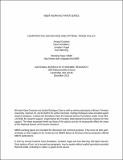Comparative Advantage and Optimal Trade Policy
Author(s)
Costinot, Arnaud; Donaldson, David John; Vogel, Jonathan; Werning, Ivan
DownloadCostinot_Comparative advantage.pdf (332.3Kb)
OPEN_ACCESS_POLICY
Open Access Policy
Creative Commons Attribution-Noncommercial-Share Alike
Terms of use
Metadata
Show full item recordAbstract
The theory of comparative advantage is at the core of neoclassical trade theory. Yet we know little about its implications for how nations should conduct their trade policy. For example, should import sectors with weaker comparative advantage be protected more? Conversely, should export sectors with stronger comparative advantage be subsidized less? In this article we take a first stab at exploring these issues. Our main results imply that in the context of a canonical Ricardian model, optimal import tariffs should be uniform, whereas optimal export subsidies should be weakly decreasing with respect to comparative advantage, reflecting the fact that countries have more room to manipulate prices in their comparative-advantage sectors. Quantitative exercises suggest substantial gains from such policies relative to simpler tax schedules.
Date issued
2015-02Department
Massachusetts Institute of Technology. Department of EconomicsJournal
Quarterly Journal of Economics
Publisher
Oxford University Press
Citation
Costinot, Arnaud, Dave Donaldson, Jonathan Vogel, and Iván Werning. “Comparative Advantage and Optimal Trade Policy.” The Quarterly Journal of Economics 130, no. 2 (February 3, 2015): 659–702.
Version: Original manuscript
ISSN
0033-5533
1531-4650